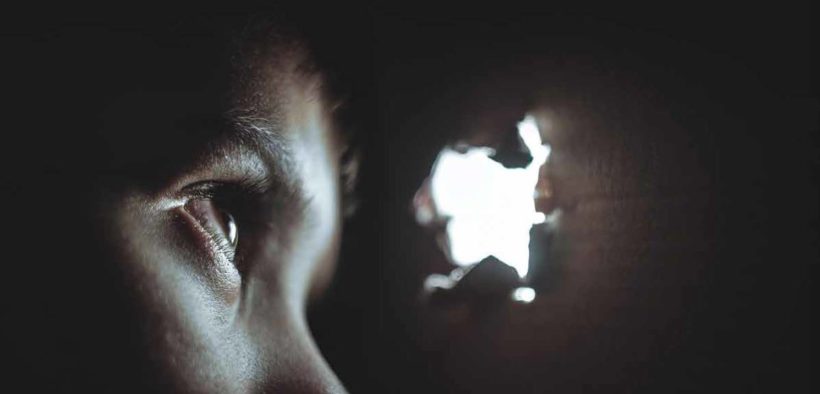No More Darkness

The Iksha Foundation helps kids battle a little-known, but extremely curable, cancer
BY SUMI THOMAS
Eyes, eyes, eyes, to read a book by, Nose, nose, nose, to breathe in and out…” Most of us grew up in the rhythm of this kindergarten rhyme. We would feel our eyes, our nose, our mouths and limbs as we screamed the lyrics out. Quite a nostalgic recollection of a sublime childhood, right? But what if, for a bunch of little ones, their rhyme ended at the first line? The ones for whom plain eyesight seems like a luxury? Retinoblastoma, a type of aggressive eye cancer that affects children globally, predominantly in the developing nations, has been claiming the lives of our children for a while now. And the hard fact, you ask? Every day, four children in India are born with RB, of which one dies due to the disease. But seeking to create a paradigm shift, a little over eight years into their existence, is Bengaluru’s Iksha Foundation, a non-profit that has proudly helped nearly 70 children envision a better future for themselves. These children could have lost their eyesight, or worse, even their lives to this disease that affects 1 in 15,000 children globally.
What makes this fact almost unbearably sad is that this cancer, which mostly occurs in infants and younger children, has one of the best cure rates when compared to other childhood cancers. Globally, studies show that nine out of ten children affected by retinoblastoma can be cured, unless cancer has spread outside of the eye.
In India, most cases of eye cancer are either detected too late or once diagnosed, patients are left without receiving the required treatment. This adds up to the abysmal mortality rate of 80 percent in developing countries today. When the founders of the Iksha Foundation— Thanmaya Bekkalale, Aravind Seshadri and Rajeev Raju—found that financial aid was one of the stumbling blocks to curing retinoblastoma, they stepped up to create the charitable trust in February 2010.

Thanmaya Bekkalale
Co-Founder, Iksha Foundation
“We are all childhood friends and we heard about RB through a friend who is a pediatric ophthalmologist,” says Bekkalale. “We chose RB for many reasons, one of them being the fact that it is not an ailment that would attract a lot of government or celebrity attention and therefore, needed the most help.” Their committed efforts have brought light into a whole lot of little lives. Like that of the precocious little Keerthana. The five-year-old was diagnosed with unilateral RB a year earlier. But Keerthana’s parents, who are daily wage laborers, found it extremely challenging to support her treatment financially, especially since her mother had to quit her job in order to tend to her daughter’s needs. But offering them solace and gladly taking up their burden was the Iksha Foundation, who funded her treatment, which included six rounds of chemotherapy and enucleation of the right eye. Keerthana has started school now and Iksha is actively involved in supporting her education as well.
Iksha’s tie-up with the Narayana Hrudayalaya hospital in Bengaluru ensures that children supported by the foundation and treated at the Mazumdar Shaw Cancer Centre gain access to treatment without any ensuing costs, be it doctor’s fees, administrative charges, or ward fees. In addition to this, the NGO receives support from its CSR partner, RBL Bank. “The funding requirement is increasing each year as we expand the scope of our network with more hospitals,” says Bekkalale. “Our requirement is between Rs 25 lakh and 30 lakh annually.” Most of Iksha’s fundraising activities revolve around sports. “All the trustees are into sports and have used our participation in sporting events like marathons and cyclotrons to raise funds,” he says. “We also have an annual cake sale that’s hosted by a five-star hotel, the proceeds of which go to Iksha.”

The foundation has begun working with government-run primary health care centers in a bid to raise awareness about RB. “In medical terms, the degree of blindness is measured by the number of years the person is blind,” explains Bekkalale. “For example, if a person loses his eyesight at the age of 85 years, the number of years of blindness is very few and hence, the degree of blindness is low. For an infant, however, the blindness is life-long; hence, the greater the degree of blindness. RB is only one of the causes of early childhood blindness. We want to expand the scope to help prevent all causes of childhood blindness.”
Iksha Foundation is standing up for a cause disturbingly less heard of, yet holding much contemporary relevance. In doing the unparalleled, the NGO is creating history, one precious child at a time. For today they open their eyes, tomorrow they open their souls
















